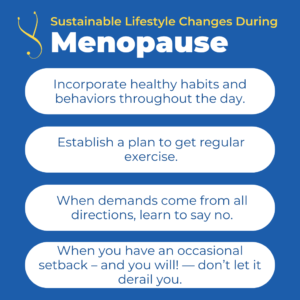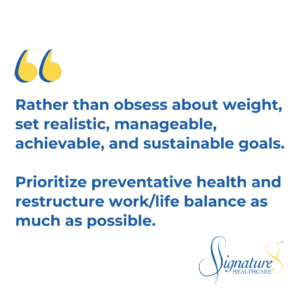Does Progesterone Cause Weight Gain? What Menopausal Women Need to Know
Women in menopause often notice an extra inch or two around their midsection and ask, “Is menopause making me heavier? Does progesterone cause weight gain?”
The short answer to both is no. But there are contributing factors.
Often, the added pounds are midlife weight gain. In women, fat redistributes during menopause, creating more abdominal than pelvic fat. This shift may affect how clothes fit or how a woman feels or looks.
Menopause isn’t behind the weight gain. However, untreated symptoms of menopause may indirectly add pounds. For example, symptoms like mediocre sleep or fluctuating emotions lead to poor eating choices or lack of exercise, contributing to extra weight.
Hormone replacement therapy (HRT) isn’t linked to weight gain either. The amounts of progesterone and estrogen used in HRT are low compared to premenopausal levels.
HRT may even be slightly beneficial at stabilizing weight in perimenopause due to improved control of perimenopausal symptoms.
So, What’s Responsible for Midlife Weight Gain?
Weight accumulation over decades
Many women gain a pound or two a year in adulthood. After a few decades, that slow but steady weight gain becomes more significant.
Changes in metabolism
Although she’s following her longtime diet and exercise routine, a woman in midlife may notice she’s gaining weight anyway. This may be due to metabolic change, a gray area of natural aging creating much discussion in the medical community.
Increased stress levels
Many midlife women raise kids, care for aging parents, and manage a career. Day-to-day stress may result in poor diet or emotional eating and lack of sleep and exercise, contributing to extra pounds.
Weight gain or obesity in midlife may cause a variety of other complications, such as:
- Worsened vasomotor menopause symptoms (hot flashes, night sweats)
- Sleep apnea
- Osteoarthritis or increased wear and tear on joints
- Development of hypertension and heart disease
- Diabetes
- Higher risk of breast and other cancers

Do Lifestyle Changes Help?
Most menopausal women can’t revamp their lives all at once to immediately eliminate stressors, eat healthier, and exercise regularly. It’s a marathon, not a sprint. But you needn’t run a marathon to be healthy!
Rather than obsess about weight, set realistic, manageable, achievable, and sustainable goals. Prioritize preventative health and restructure work/life balance as much as possible:
- Incorporate healthy habits and behaviors throughout the day. Make small changes as you go and build on them incrementally.
- Establish a plan to get regular exercise. Make it as routine as brushing your teeth to keep your body in sync and on track.
- When demands come from all directions, learn to say no. Take advantage of helpful protocols in your community or on the job, such as employee health programs.
- When you have an occasional setback — and you will! — don’t let it derail you. Concentrate on moving forward and getting back to your healthy routine.

Tips to Keep Midlife Weight Off
Move!
Regular movement is one of the best ways to minimize midlife weight gain.
But leisurely walking the dog doesn’t deliver the intensity you need. The CDC recommends 150 minutes per week of moderate-intensity exercise — physical activity that makes you work hard enough to raise your heart rate, breathe harder, and sweat a little.
Data shows what we know intuitively: The more steps you take, the better your health outcome. Your risk of dementia may be cut in half if you hit 10,000 steps per day, and the risk of cardiovascular disease can be reduced with just 3,000–4,000 steps per day.
Any number of steps qualifies as risk reduction, so:
- Take the stairs at work.
- Walk during your lunch break or after a meal.
- Park farther out in the lot rather than right next to the building.
- Don’t avoid hills and inclines — they increase calorie burn and strengthen muscles.
Try to alternate sitting and standing at your desk (a combination is best) with a balance board or core ball. If feasible, consider working at a treadmill desk or on an elliptical trainer.
Increase Muscle
Add muscle-building and resistance training to your routine to burn more calories and encourage greater fitness. Muscles burn calories when you’re at rest, so working them out is beneficial.
Even if you’ve weight-lifted in the past, don’t immediately try to lift 20 pounds. Perimenopausal women risk frozen shoulder, tendonitis, and other musculoskeletal issues if they proceed too quickly. There’s even a new name for it: musculoskeletal syndrome of menopause.
Consider a few preliminary sessions with a trainer who understands middle-aged bodies to guide you properly. At Signature, a complimentary exercise physiology consultation is available with your membership.
Here are a few more tips:
- Start low and go slow. Consider light hand weights when you’re a passenger in the car.
- Try resistance bands when traveling, sitting in a carpool, or at your desk.
- Try my niece’s trick for core strength: Do 15 pushups and a plank before bedtime, then another plank in the morning when you get up. These exercises fortify your core and strengthen you for other workouts.
- Stabilize your core by sitting on an exercise ball or standing on a balance board when you work.
Stay Nourished
- Avoid fad diets, which are often ineffective or unsustainable. Focus on the Mediterranean diet, which recommends a helping of oily fish (salmon, trout, herring) at least twice a week. Follow the diet’s recommendations for proper portions of fruits and vegetables.
- Get a recommended level of fiber. Fiber helps you feel full so that you may be less hungry. Try fiber supplements, whole grains, and sunflower, flax, and chia seeds.
- Limit processed foods or other foods heavy in sugar and unhealthy fats. Foods with 30 ingredients probably aren’t healthy for you.
- Avoid excess sodium in preserved meats, canned food, soups, and certain sauces and dressings.
- Increase your protein intake in the morning or as a midday snack, like lentils, legumes, eggs, nuts, cottage cheese, and Greek yogurt.
- Minimize your alcohol intake, which is empty calories. Alcohol interferes with sleep cycles and increases your risk of liver disease and cancer.
- Prepare food at home rather than ordering takeout as often as possible. Home cooking with healthy ingredients is key to a better diet.
See Your Doctor Regularly
Schedule a regular visit to your physician to help with midlife weight gain as you enter your 40s and 50s. Here’s why:
- An underactive thyroid in midlife may affect weight, drive overeating, lessen your desire to exercise, and aggravate other menopausal symptoms.
- Your doctor can assist you with getting restful, restorative sleep and better manage stress, anxiety, or depression that triggers weight gain.
- If your joints hurt, you may be overly sedentary. See your physician — and, if necessary, a physical therapist — to optimize your musculoskeletal health or manage wear and tear from arthritis.
- Certain medications or herbal supplements might drive your weight gain. Never stop them on your own. Follow your physician’s advice on which to decrease, when, and how.
Treatments for Weight Loss
Depending on your health and circumstances, your physician may recommend pharmacologic or non-pharmacologic approaches to weight loss, including:
Non-pharmacologic treatments
- Sustainable diet-based programs
- Exercise programs that balance cardio and weight resistance training
- Procedures to limit the amount of food consumed, such as bariatric surgery
- Behavioral therapy helps reduce emotional eating and unhealthy relationships with food
Pharmacologic treatments
- Stimulants like the appetite suppressant phentermine. Its potential side effects include high blood pressure, anxiety, or reflux, all possible issues in midlife.
- Phentermine-Topamax (topiramate) combination further quells appetite and food drive. But be careful — this treatment may interfere with fat absorption or cause diarrhea or incontinence.
- Contrave (naltrexone and bupropion) interferes with food reward pathways.
- GLP-1 agonists are highly effective at shedding up to 15% of body weight over time. They include:
A Word About GLP-1s
The benefits of GLP-1s outweigh the risks for patients with a body mass index (BMI) of 30 or higher.
However, GLP-1s partially slow gastric motility, which may induce gastroparesis, causing nausea, vomiting, or constipation.
Additionally, significant weight loss can cause “Ozempic face” (sagging skin and hollowness at the eyes and cheekbones) and reduced muscle mass. GLP-1s also have a potential link to pancreatitis and gallbladder disease.
The use of GLP-1s also calls for lifestyle changes. Most physicians prescribe them only after the patient incorporates dietary changes, exercise, and stress management into their routine — important habits to keep weight off once it’s lost.
Does Progesterone Cause Weight Gain?
As mentioned, progesterone doesn’t cause weight gain. Excess weight typically accumulates due to various poor habits and increased sedentary behavior.
In the U.S., nearly three-quarters of adults are overweight or obese, with an average BMI over 25. And in Charlotte, 67% of adults are considered overweight or obese.
Are you concerned about weight gain or have questions about midlife changes? Schedule a chat with your Signature Healthcare physician.
We’re here to help you make recommended lifestyle changes while keeping your eyes on the prize: increased longevity and a healthier quality of life.

Dr. Elizabeth Abernathy
Dr. Abernathy, board certified in Internal Medicine and a Fellow of the American College of Physicians, has a rich medical background with roots in Charlotte. She graduated from Davidson College, majoring in Medical Ethics, and completed her medical education and a fellowship at UNC Chapel Hill. With 14 years of medical practice in Charlotte, she spent a decade at Carolinas Medical Center teaching ethics, health policy, and clinical decision making. Dr. Abernathy also holds an MHA from UNC Chapel Hill School of Public Health, aiming to enhance her understanding of healthcare systems and economics. Outside of medicine, she enjoys history, travel, literature, and spending time with her family and their foxhound.


